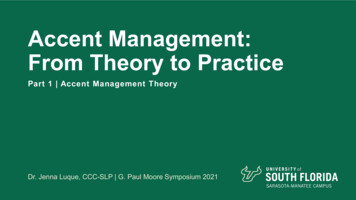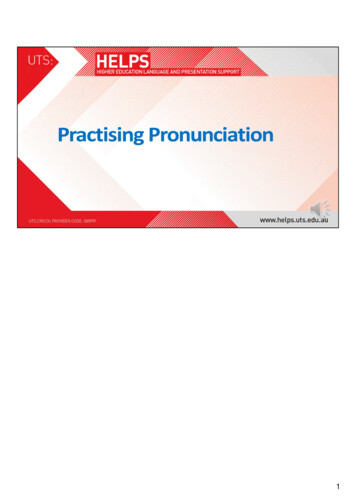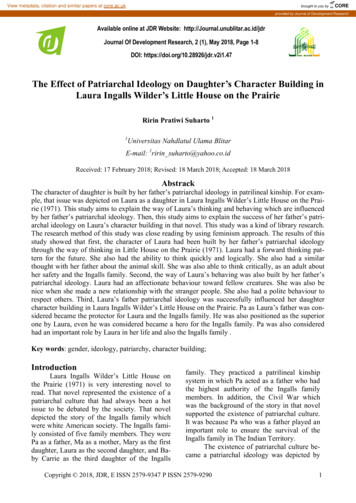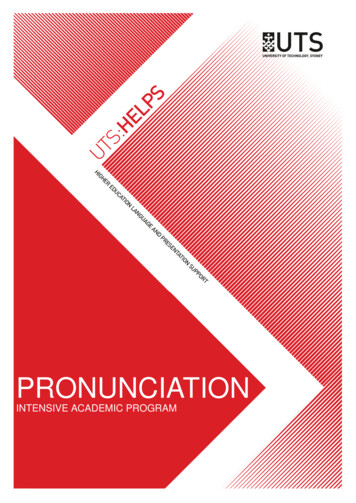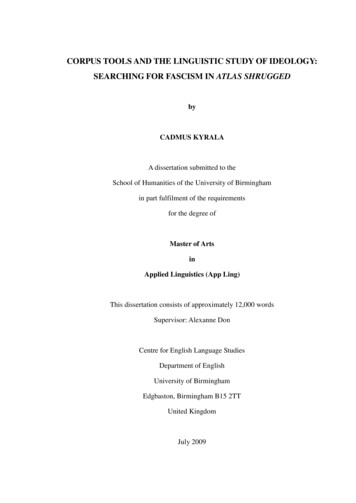
Transcription
Accent, Standard Language Ideology, and Discriminatory Pretext in the CourtsAuthor(s): Rosina Lippi-GreenSource: Language in Society, Vol. 23, No. 2 (Jun., 1994), pp. 163-198Published by: Cambridge University PressStable URL: http://www.jstor.org/stable/4168513Accessed: 06/10/2009 10:10Your use of the JSTOR archive indicates your acceptance of JSTOR's Terms and Conditions of Use, available rms.jsp. JSTOR's Terms and Conditions of Use provides, in part, that unlessyou have obtained prior permission, you may not download an entire issue of a journal or multiple copies of articles, and youmay use content in the JSTOR archive only for your personal, non-commercial use.Please contact the publisher regarding any further use of this work. Publisher contact information may be obtained herCode cup.Each copy of any part of a JSTOR transmission must contain the same copyright notice that appears on the screen or printedpage of such transmission.JSTOR is a not-for-profit service that helps scholars, researchers, and students discover, use, and build upon a wide range ofcontent in a trusted digital archive. We use information technology and tools to increase productivity and facilitate new formsof scholarship. For more information about JSTOR, please contact support@jstor.org.Cambridge University Press is collaborating with JSTOR to digitize, preserve and extend access to Languagein Society.http://www.jstor.org
Language in Society 23, 163-198.Printed in the United States of AmericaAccent, standardlanguageideology, anddiscriminatorypretextin the courtsROSINA LIPPI-GREENDepartment of Germanic Languages and LiteraturesUniversity of MichiganAnn Arbor, Michigan 48109-1275ABSTRACTTitleVII of the U.S. CivilRightsAct clearlyforbidsan employerto discriminateagainstpersonsof color for reasonsof personalor customerpreference.Similarly,a qualifiedjob applicantmay not be rejectedonthe basisof linguistictraitslinkedto nationalorigin.In contrastto racialdiscrimination,however,an employerhas considerablelatitudein matters of language,providedin partby a judicialsystemwhichrecognizesin theory the link betweenlanguageand social identity,but in practiceis often confoundedby blindadherenceto a standardlanguageideology.areof this type of linguisticdiscriminationThe natureand repercussionshereexplored.(Languageand law, accent,discrimination,standardlanguage ideology, criticallanguagestudies)*"The stranger within my gate,He may be true or kind,But he does not talk my talk I cannot feel his mind.I see the face and the eye and the mouth,But not the soul behind.The men of my own stock,They may do ill or well,But they tell the lies I am wonted to,They are used to the lies I tell;And we do not need interpretersWhen we go to buy and sell."Rudyard KiplingIn 1965, at the age of 29, SulochanaMandhareleft her home in Maharashtra, India, and came to the United States. At that point in her life, Ms.? 1994 Cambridge University Press 0047-4045/94 5.00 .00163
ROSINALIPPI-GREENMandhare- a native speakerof Marathi- had been studyingEnglishforalmost 20 years.Ms. Mandhareis soft-spoken;she speaksan Englishwhich is characterized by full vowels in aspiratedfricatives,anda lackof distinctionbetweeninitial/v/ and /w/. Sheis an intelligentand articulatewoman,and she tells her story in a clearandcompletelycomprehensiblelanguage.After some time in the U.S., Ms. Mandharerelates,she decidedto condegreesin both libtinueher education.She had arrivedwithundergraduateeral arts and education;but she returnedto school, and in 1972completeda master'sdegreein educationat New Orleans'sLoyolaUniversity.In 1979she was certifiedas a school librarianafter completinga programat Nichols State University.After workingfor one year as an elementaryschoollibrarian,Ms. Mandhareappliedfor and was givena job as a librarianat aschool servingkindergartenthroughsecondgradein the Lafargue,Louisiana, school district,for the 1980-81 school year.Ms. Mandharespeaks of that year as a happy and successfulone. Herwereto overseethe smalllibrary,readstoriesto the children,responsibilitiesand introducethemto usingthe resources;she enjoyedthis work.Therefore,when in April 1981 she was told that her contractwould not be renewedbecauseof her "heavyaccent,speechpatterns,and grammarproblems"- inspite of her excellentskillsas a librarian(Mandhare1985:240-41)- she wasstunnedand angry.' She investigatedher options; and becauseshe understood that the U.S. CivilRightsAct prohibitsdiscriminationby nationalorigin in the workplace,she filed suit. This civil action was decidedin Ms.Mandhare'sfavor, but the decisionwas reversedby the U.S. Court of Appeals in favor of the school board.2Ms. Mandhare'scase, andotherslike hers,areimportantbecausetheyprovide real-lifeexamplesof manyphenomenawhichhave long been of interest to linguists. There is a body of work on the processesinvolved whenlistenersevaluatespeakers(Lambertet al. 1960, Carranza& Ryan 1975,Rickford 1985), on social stereotypingbased on language(Lambert1967,Giles& Ryan1982),on the psychologicalprocessesinvolvedin speechaccommodation(Giles 1984, Giles & Coupland1991),on the cognitiveprocesseswhichstructurecollaborationin discourse(Clark& Wilkes-Gibbs1986),andon language-focuseddiscrimination(Labov1969,Giles 1971,Kalin& Rayko1978, Milroy & Milroy 1985, Rickford& Traugott 1985). More recently,therehas developeda body of work on the relationshipamonginstitutionalized power constructs,ideology, and language(Thompson 1984, Kress1985, Fairclough1989).But in spite of such extensiveinquiry,many areasremainunexplored.One such area is the rangeof ways in which accent isdefined, and how it is put to use.Accent is used by phoneticiansto discusspitch or stress, or by orthog164Language in Society 23(2)
ACCENTANDDISCRIMINATORYPRETEXTIN THECOURTSraphersto referto specificdiacritics.More generally,however,the term isused as a loosely definedreferenceto sets of distinctivedifferencesover geographicor social space, most usuallyphonologicaland intonationfeatures.In the case of second languagelearning,accent may refer to the carryoverof native languagephonology and intonationinto a target language.One of the first, and sometimesmost difficult, lessons for a linguist intraining is the abandonmentof subjectiveevaluations. In the pursuit ofknowledgeabout the structureand functionof language,heavilyinfluencedby scientificmethod,belief has no place;it can serveonly to obscurethe process of discovery. Linguistsproceed on the assumptionthat all naturallyoccurringlanguages,whetheror not they havea literatetradition,areequallyfunctionaland have the same potentialto developfurtherfunctionsas necessary;therehas been no evidencein the many yearsof inquiryto disprovethis rom speech,speechfrom communication,and fluencyfrom communicativecompetence.(Likeaccent,fluency is a generalterm withouttechnicaldefinition.) The crucialconcept of communicativecompetenceis defined as the ability to use andinterpretlanguagein a stylisticallyand culturallyappropriatemanner.Thismovesfar beyondthe set of phonologicaland intonationfeatureswhichbundled togethermay be markedas accent.The generalpublic, however,does not make such distinctions.For mostpeople, accentis a dustbincategory:it includesall the technicalmeanings,and a moregeneraland subjectiveone: accentis how the other speaks. It isthe first diagnosticfor identificationof geographicor social outsiders.Fora native of the north side of Chicago - a cab driver, elementaryschoolteacher,or districtjudge - all the following"havean accent":people fromsouthernIndiana,Georgia,Brooklyn,England,or SouthAfrica;the nativespeakerof AfricanAmericanEnglishVernacularwho lives down the streetor westof the Loop;the co-workerfromJamaica;andthe mansellingpaperson the cornerwhose Guatemalanphonologyand intonationshine throughinto his English.No distinctionis madebetweenpidginor creole, sociallyorgeographicallybasedvariation,nativeor nonnativelanguage:they are all justaccents,whichmay be describedas adenoidal,barbarous,broad, cute, distinct, educated,flat, foreign, funny, guttural,harsh, heavy, lilting, nasal,posh, provincial,quaint, rough, rustic, sing-song, strong, and uneducated(McArthur1992:10).The subjectivenatureof these qualifiersis clear.Muchof linguisticvariationis structuredaroundsocialidentity.Linguistsknow this, but nonlinguistsknow it too, and act on it: accentbecomesbothmannerand means for exclusion. The fact is, however, that when peoplerejectan accent, they also rejectthe identityof the personspeaking:his orher race, ethnic heritage,nationalorigin, regionalaffiliation, or economicclass.3Thus the concept of accent, so all-encompassingin the mind of thepublic, is a powerfulone which needs to be investigated.Language in Society 23(2)165
ROSINALIPPI-GREENIn the remainderof this article,my goal is to illustratethe natureandsomeof the repercussionsof accentdiscrimination.In the process,I hope to demonstratethat accent- particularlywhenassociatedwithracial,ethnic,or culturalminorities- is most likelyto pose a barrierto effectivecommunicationwhentwo elementsare lacking.The first elementis a basiclevel of communicativecompetenceon the part of the speaker,independentof Li phonology and intonation.The secondelement,even moreimportantbut far moredifficult to assess, is the listener'sgoodwill. Without that goodwill, thespeaker'scommandof the language,i.e. his or herdegreeof communicativecompetence,is irrelevant.Prejudicedlistenerscannothearwhata personhasto say, becauseaccent, as a mirrorof social identityand a litmus test forexclusion, is more important.After a moregeneraldiscussionof backgroundissues,the examinationofaccent discrimination,referredto here more specificallyas language-traitfocused (LTF)discrimination,is limitedbecauseof spaceconsiderationstothe workplaceand the courts. More generallythis is the beginningof anexplorationof why so many of us continueto use linguistictraitsto rationalizeand justify discriminationof all kinds- and to toleratesuch discrimination, even when it is directedtowardourselves.STANDARDLANGUAGEIDEOLOGYIn mattersof languagehistory,structure,function,and standardization,theaverageindividualis, for the most part, simultaneouslyuninformedandhighly opinionated.When asked directlyabout languageuse, most peoplewill drawa verysolidbasicdistinctionof "standard"(proper,correct)Englishvs. everythingelse. If askedfor a moreexactingdefinition,most will not beable to provideit, or will couch it in termsof salientfeaturesof nonmainstreamlanguagevarieties:"ProperEnglishis havingyour subjectsand verbsagree"; "Why can't they see that the word is spelled a-s-k, not a-x?";"[kwifi] - that sounds so ignorant."LTFdiscriminationstemsprimarilyfromthe acceptanceof a standardlanguageideology(a termcoinedby Milroy& Milroy1985).The definitionusedhereis: a biastowardan his imposedfrom above, and whichtakes as its model the writtenlanguage. The most salientfeatureis the goal of suppressionof variationof allkinds.4What is the source of the standardlanguage(SL) ideology? How is it"imposedfrom above"?Who is responsiblefor its propagation?5SL ideologyis part of a greaterpowerconstruct,a set of social practiceson whichpeople dependwithoutclose analysisof underlyingassumptions.In a thought-provokingdiscussionof the gh(1989:33)pointsout that this institutionalizationof166Language in Society 23(2)
ACCENTAND DISCRIMINATORYPRETEXTIN THE COURTSbehaviorswhichoriginatewith the dominantbloc (an allianceof those whosee their interestsas tied to capitaland capitalism)functionsto keep separate the poweredand the disempowered:Ideologicalpower, the powerto projectone's practicesas universaland"commonsense,"is a significantcomplementto economic and politicalpower, and of particularsignificancehere becauseit is exercisedin discourse . There are . in gross terms two ways in which those whohavepowercan exerciseit and keepit: throughcoercingothersto go alongwith them, with the ultimatesanctionsof physicalviolence or death; orthroughwinningothers'consentto, or at least acquiescencein, theirpossession of exerciseof power. In short, throughcoercion or consent.The SL ideologyis one route,and a majorone, to establishingconsent.Thereare four immediatelyidentifiableproponentsof SL ideology,all of whicharepart of the "dominantbloc": the educationalsystem, the news media, theentertainmentindustry,and whathas beengenerallyreferredto as corporateAmerica.At the end of this article,I arguefor addingthe judicialsystemtothis list.The educationalsystem and standardlanguageideologyMuchof whatthe Americaneducationalsystemteacheschildrenabout languageis factuallyincorrect;in this it is thorough,consistent,and successfulacrosssocial and economicboundaries.The phenomenonhas been observedby others:It is a tributeto our educationalsystemthat the overwhelmingmajorityof Americanshavebeeninstilledwith a rocklikeconvictionthat certainlinguistic forms are correct,while othersare wrong. Even those Americanswho areuncertainaboutpreciselywhichformsare correctareusuallyconfidentthatto findthe answertheyneedonly look the matterup in the rightbook or consult the properauthority.(Burling1973:130)Theseare strongstatements,but they are easilyverified.Everyonehas entaryschooleducation,but strongerevidenceis availablein a wide rangeof texts writtenfor teachers and children.The underlyingmessageis clear in each of the followingexamples.6(a) A directlink between"nonstandard"languageand lack of logic andclarity, with blurringof the written/spokenboundaries:Almost any sentenceor sentencefragmentmay be acceptablein casualconversation.In moreformalspeakingand writing,however,nonstandardgrammaris rarelyacceptable.We need to know how to speak and writeLanguage in Society 23(2)167
ROSINALIPPI-GREENin complete, grammatical sentences that convey our thoughts clearly toothers. (Ragno et al. 1987:T22)(b) There is one correct way to speak and write English:[This series of textbooks] focuses on grammar study, listening and speaking skills, and correct usage. (Strickland 1983:T21)(c) Overt authoritarianism:Practice saying the following combinations of words. Avoid slurring anysounds, such as whacha for what do you . Whip is pronounced hwip,not wip . . pronounce the following troublesome words correctly. Consult the dictionary if you are in doubt . . Twenty-five words often misspelled because of faulty pronunciation: busy, which, since, history .(John et al. 1975:28-9)7SL ideology is found at work not just in textbooks and language arts instruction classrooms, but also in school administration. In 1987, the Board ofEducation of Hawaii put forth a proposed policy on "Standard English andOral Communication," which would have outlawed Hawaiian Creole English(HCE) in the schools. A survey of 986 graduating seniors, conducted by aHonolulu newspaper, indicates how well many of those students were indoctrinated in the SL ideology, and serves as an illustration of the ideology'sclose relationship to issues of race and economics.Whereas only 26 percent of the private school students surveyed felt thatHCE use should be allowed in school, 54 percent of the public school students supported this idea . . . Comments ranged from "Pidgin English fosters illiteracy," "Pidgin is a lazy way to talk; it promotes backwardthinking," and "CorrectEnglish will get you anywhere"to the polar opposites of "Banning pidgin would violate our freedom of speech," "Pidginis a natural language," and "It's our way to make Hawaii different fromanywhere else in the United States." (Verploegen 1988, as cited by Sato1991:654)Many empirical studies of American students also illustrate this phenomenon. Using matched-guise testing, Carranza & Ryan 1975 showed thatAfrican-American, Anglo, and Hispanic students all found Spanish-accentedEnglish to be lacking in prestige and inappropriate for a classroom setting;8in Ryan et al. 1977, "Small incrementsin accentednesswere found to be associated with gradually less favorable ratings of status, solidarity, and speechcharacteristics" (summarized by Eisenstein 1983:173).Are there no examples of educators with more informed and enlightenedapproaches to diversity in language? teachers who strive to teach children toread and write, and at the same time respect the sanctity of the home lan-168Language in Society 23(2)
ACCENTDISCRIMINATORYANDPRETEXTIN THECOURTSguage and social identity?teacherswho questionunderlyingassumptions,and who do not automaticallycontributeto the propagationof the currentpowerdistribution?Of coursethereare. Take for exampleMaryBergerofColumbiaCollege in Chicago- who, as an Englishteacher,"teachesstandardstyle to augment,not replace,dialect"(Warren1993:2).The ChicagoTribunefound Ms. Berger'smethodsso remarkablethat they ran an articleon her approach,and highlightedher classroompracticeof "[not]scold[ing]her black students . when they said 'ax', rather than 'ask' . . . "For the most part, however,teachersare boundby the standardlanguageideology. For example,almostexactly 15 yearsafter the controversialKingcase was decidedin Ann Arbor,parentsof AfricanAmericanmiddleschoolstudentscomplainedto the school boardabout a teacherwho allegedlyhadbeen ridiculingBlackstudentsfor usingtheirhome language,specificallyforsayingax insteadof ask (Windsor1993:C1,C3).9Standardlanguageideologyis a basicconstructof our elementaryand secondary schools' approachto languageand philosophyof education. Theschoolsprovidethe firstexposureto SL ideology,but the indoctrinationprocess does not stop when the studentsare dismissed.The media and the standardlanguageideologyThe media- and by this is usuallymeantnationalbroadcastinginstitutionshave taken on the job of defendingthe "nationalculture"(Cormack1993:102-3), which means the propagationof a homogeneousnation-state,inwhicheveryone mustassimilateor be marginalized.As partof this process,the printand broadcastnews mediaand the entertainmentindustrytake onthe job of reinforcingSL ideology on a daily basis.10of the standardlanguageideolPerhapsthe most pervasiverepresentativeogy is the newsmedia.This is accomplished,in part, by meansof languagewithoutfactualbasis.It is sometimesconsciousreporting,whichis prescriptivealso overtlydiscriminatory.An excellentexampleof this is the Hawai'ianprint media coverage of Governor John Waihe'e, whose code-switchingEnglishis madean issue,and whosegrambetweenHCE and creole-accentedmatical"errors"are corrected(reportedby the NationalPublic Radio show"All Things Considered,"September12, 1990;also verifiedby the mplaintsaboutlanguageuse aretuckedawayas an afterthought,but the underlyingmessageis clear:thereis a rightand a wrongwayto talk, and it is perfectlyacceptable,even judicious, to censorand punishthose who do not conform:Residentsof Brooklyn,New York,havelong beenknown- and sometimesmocked- for theirheavyaccents.GinnyMost reportson a groupof students who are trying to learn to talk right - or should I say correctly.169Language in Society 23(2)
ROSINA LIPPI-GREEN[G.M.]: Some people have a funny way of sayingwhat flows undertheBrooklynBridge. [Student]:"wata- it's so ugly". (CNN HeadlineNews, March12, 1993)Ungrammaticalstreettalk by blackprofessionalathletes,and otherblacksin publicprofessionssuchas the musicindustry,has come to be accepted.The dilemma is that it doesn't make much difference for the blackprofessionalathletes,etc., who talk this way - they'rewealthymen whoare going to live well off their bodily skills no matterif they can talk atall, much less correctly. . . (Bob Greene'ssports column, Chicago Tribune, December 3, 1979)11We like Hahn, 34, who was bornin SouthKoreaand whosepositionsoncontrollinggrowthare much like our own. Unfortunately,we think hisheavy accentand somewhatlimitedcontactswould make it difficult forhim to be a councilman.("ForSanta ClaraCounty,"San Jose MercuryNews, October 18, 1988, as cited in Matsuda1991:1346)[Oprah] is an image. So is Jesse Jackson . They can effectively articu-late with subjectand verbagreement.And if it had not been for God whogives us the wisdom- we have to attributethis to God - to know how tosound, to articulateand to know how to use subject-verbagreements,wewouldn'tbe wherewe are today. (Toni Tucker,African-Americantalkshowhost, as audiencememberon "BlackEnglish,"OprahWinfreyShow,November19, 1987)Gov. Clinton,you attendedOxfordUniversityin Englandand Yale LawSchool in the Ivy League,two of the finest institutionsof learningin theworld. So how come you still talk like a hillbilly?(Mike Royko'ssyndicated "Opinion"column, Ann Arbor News, October11, 1992)12The mediaclaim that the intentionis not to make news, but reportit, andthat they do not intendto serveas an agentof social changeor an enforcerof norms.Of course,this line is crossedrepeatedlyby the media, simplybyvirtueof the topics chosen for reporting.In bringingto the public'sattention the boom in accent-reductionschools, and by slantingthe tone of theirreportstowardan idealizedstandard,the mediabecomecomplicitin the process of discrimination.The SL ideologyis introducedby the schools; it is vigorouslypromotedby the media, and (as is shownin the next sections)is furtherinstitutionalized by the corporatesector.Thusit is not surprisingthat manyindividualsdo not recognizethe fact that, for spokenlanguage,variationis systematic,structured,and inherent,and that the nationalstandardis an abstraction.What is surprising,even deeplydisturbing,is the way that many individuals - thoughthey considerthemselvesdemocratic,even-handed,and free of170Language in Society 23(2)
ACCENT AND DISCRIMINATORY PRETEXT IN THE COURTSprejudice - hold tenaciously to a standard ideology which attempts to justify restriction of individuality and rejection of the other.LTF discrimination can be found everywhere in our daily lives. In fact,such behavior is so commonly accepted, so widely perceived as appropriate,that it must be seen as the last widely open backdoor to discrimination.LTF DISCRIMINATIONAND THE CIVIL RIGHTS ACTSome types of LTF discrimination have been illegal in the workplace since1964, when Title VII of the Civil Rights Act of 1964 (42 United States Code?2000e-2000e-17 [1982]) was passed into law.'3Title VII provides recourse for workers who are discriminated against onthe basis of race, color, religion, sex, or national origin.'4 However, it wasnot until 1980 that the Equal Employment Opportunity Commission(EEOC), a body created by Title VII, directly addressed trait-based discrimination.15 In their Guidelineson discriminationbecauseof nationalorigin,revised on a regular basis, the EEOC currently defines national origin discrimination: ". . . broadly as including, but not limited to, the denial ofequal employment opportunity because of an individual's, or his or herancestor's place of origin; or because an individual has the physical, culturalor linguistic characteristicsof a national origin group" (Federal Register 1988,11606.1; emphasis added). The spirit of the law is clear: an employer maynot reject a job candidate, or fire or refuse to promote an employee, becausethat employee externalizes in some way an allegiance to another culture.In the case of racial discrimination, "It is clearly forbidden by Title VIIto refuse on racial grounds to hire someone because your customers or clients do not like his race" (Matsuda 1991:1376, fn. 169). Similarly, a qualified person may not be rejected on the basis of linguistic traits that theemployer or the employer's customers find esthetically objectionable. In contrast to racial discrimination, however, an employer has some latitude in matters of language: 16 "an adverse employment decision may be predicatedupon an individual's accent when - but only when - it interferes materiallywith job performance" (Civil Rights Act of 1964, ?701 et seq., 42 U.S.C.A.?2000e et seq.).'7Title VII is very limited in its scope. Under the law as it currently stands,discrimination on the basis of regional origination is not covered. An accentmust be directly traceable to a specific national origin to be eligible for TitleVII protection.Raj Gupta, attorney counsel to the commissioner of the EEOC, states(p.c.) that some forces within the EEOC would like to see the definition ofLTF-national origin discrimination made more comprehensive. So, in hisexample, a person from Appalachia would have recourse under Title VIILanguagein Society 23(2)171
ROSINALIPPI-GREENbecausethe featuresof Appalachianaredirectlytraceableto a numberof dialects in GreatBritain.18The legal esusuallybeginwhenan individual files a complaintwith the EEOC (or a similaragencyon a state orlocal level). The employeemay then file a civil action in the trial courts, inwhich he or she claimsthat civil liberties,as set out in the federalstatutesknownas the CivilRightsAct of 1964,havebeenviolated.In someinstances,these cases are broughtto the courtsnot by the individualor groupof individuals with the same complaint, but by a privateagency acting for theinjuredparty,such as the AmericanCivil LibertiesUnion (ACLU), or by agovernmentagency,such as the EEOC.This action may be initiatedat thestate level, as many states have adoptedcivil libertieslegislationpatternedon the federalstatutes.19An individualclaimingLTFdiscriminationmust first provea primafaciecase of disparatetreatment,in four steps: (a) establishmentof identifiablenationalorigin;(b) proof of applicationfor a job for whichhe or she wasqualified,and for whichthe employerwas seekingapplicants;(c) evidencethat the applicantwas rejectedin spite of adequatequalifications;and (d)evidence that, after such rejection, the job remainedopen, and the employercontinuedto seek applicantswith the plaintiff'squalifications.Aftera primafacie case has been established,the burdenshifts to the employerto rebutpresumptionof discriminationby articulatingsome legitimate,nondiscriminatoryreasonfor the action. If the employerdoes this, the burdenshifts backto the plaintiff,to show that the purportedreasonfor the actionwaspretextfor invidiousdiscrimination.Theplaintiffcanshowthe employer'spretextdirectly,by demonstratingthat the employerwas more likely motivatedby discriminatoryreasons;or indirectly,by showingthatthe profferedreasonis unworthyof credence(Civil RightsAct of 1964, ?701 et seq., 42U.S.C.A. ?2000eet seq.).DISCRIMINATIONINTHEWORKPLACEIn an excellentstudy of languageand discriminationin the workplaceinGreatBritain,Robertset al. 1992providednumerousexamplesof discrimination focusedon language,and directedtowardethnicand racialminorities. No suchsystematicand well-documentedstudyexistsfor workersin theU.S., althoughthis is an areaof greatimportance.The evidenceof discriminationprovidedhereis limitedto specificinstanceswhichhave found theirway into the legal system.172Language in Society 23(2)
ACCENTTABLE 1.ANDPRETEXTDISCRIMINATORYIN THECOURTSDistribution of 25 LTF discrimination cases in the courts/EEOChearings, by plaintiff's national originCourt Found foraPlaintiff'sNational OriginAsia, Pacific RimPhilippines: Lubitz,Fragante, CarinoVietnam: TranChina: Ang, HouIndia: Duddey, Mandhare, PatelCambodia: XiengKorea: ParkSubtotalCaribbean/West IndiesDominican Republic: MeijiaHaiti: StephenCuba: RodriguezSubtotalCentral/South AmericaVenezuela: DercachBolivia: IpinaSubtotalEastern EuropeArmenia: VartivarianPoland: BerkeUkraine: StaruchSubtotalAfricaNigeria: DaborLiberia: AndrewsGhana: KpodoSubtotalOtherAfrican-American: Sparks, EdwardsHawaiian Creole: KahakuaSubtotalTotalsNo. DefendantaDiscrepancy in some of the totals is due to the fact that one case (Patel) was settled out ofcourt; two others had not yet been decided (Andrews, Kpodo) at the time of this writing.Table 1 provides a breakdown of 25 LTF-national origin discriminationcases heard in the federal and state courts and by the EEOC since 1972, withexceptions as noted. Further excluded or missing are cases which concernedthe English-Only question (e.g. H. Garcia) and cases in which LTF discrimination played a minimal role in the plaintiff's arguments (C. Garcia, Bell,Language in Society 23(2)173
ROSINALIPPI-GREENand many others). In some of the cases included, both racial and nationalorigin discrimination were at issue. In most of the cases, accent, languageuse, and communication figured prominently in the testimony, argumentation, discussion, and final opinion.20How widespread is LTF discrimination? The General Accounting Officeof the United States Government (GAO GGD 90-62 Employer Sanctions, 27)conducted a carefully designed statistical study of a stratified random sample of employers nationwide, and reported that 10%oof their sample, or461,000 companies employing millions of persons, openly if naively admitthat they "discriminated on the basis of a person's foreign appearance oraccent" (ibid., 38). In hiring audits, specifically designed to detect discrimination on the basis of accent (telephone inquiriesabout advertisedjobs), suchdiscrimination was found to be prevalent (ibid.).21 This type of behaviorwas documented again in Carroll, when an employment agency receptionistwas directed by her manager to screen all persons inquiring over the telephone: to those who did not "speak right," the job was closed. The receptionist was also told to make notations about the caller's speech and accent(Carroll, 1173).There are a number of possible reasons for the low number of documentedcases. Employers who discriminate ma
In the case of second language learning, accent may refer to the carryover of native language phonology and intonation into a target language. One of the first, and sometimes most difficult, lessons for a linguist in training is the

